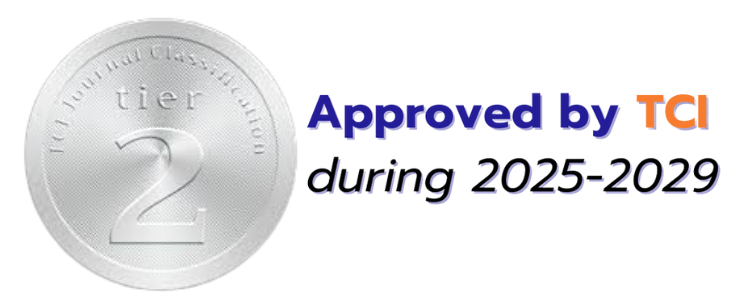The Development of a Mathematics Game Board on Three Dimensional Geometry to Enhance Mathematical Skills for 6th Grade Students at Pathana Suksa School
DOI:
https://doi.org/10.56825/jehds.2025.915859Keywords:
Board game, Three-dimensional geometry, Mathematical skillsAbstract
The purposes of this research were 1) to develop a mathematics board game on three-dimensional geometric shapes to enhance mathematical learning skills for Grade 6 students at Phatthanasueksa School in Chumphon Province, 2) to compare students’ mathematical achievement before and after using the board game, and 3) to evaluate students’ mathematical skills after instruction against a criterion score of 1.50. The participants were selected by a convenient sampling technique, which consisted of 25 Grade 6 students from Phatthanasueksa School in Thailand. The research instruments consisted of 1) a lesson plan on three-dimensional geometry, 2) a mathematics board game on three-dimensional shapes, 3) a mathematics achievement test, and 4) a process skills assessment rubric. Data were analyzed using paired-sample t-tests to compare pre- and post-test results.
The findings indicated that students’ post-test achievement scores were significantly higher than pre-test scores at the .05 level. Additionally, students’ mathematical skills scores after instruction were significantly higher than the predetermined criterion score at the .05 level. These results suggest that integrating game-based learning into mathematics instruction can effectively promote both academic achievement and skill development in primary mathematics education.
Downloads
References
Buranasinvattanakul, K. (2024). The Development of Instruction Media in Board Game to Enhance the Capability in the Development of Thai Textbook and the Happiness in Learning for Undergraduate Students. Journal of Education and Learning, 13(2), 161-170.
Chi, M. T. H. (2009). Active-Constructive-Interactive: A Conceptual Frameworkfor Differentiating Learning Activities. Topics in Cognitive Science, 1(1), 73-105.
Garris, R., Ahlers, R., & Driskell, J. E. (2002). Games, Motivation, and Learning: A Research and Practice Model. Simulation & Gaming, 33(4), 441-467.
Institute for the Promotion of Teaching Science and Technology. (2017). Indicators and core learning substances for the mathematics learning subject group. Agricultural Cooperative Assembly Press.
Kaemanee, T. (2023). Science of Teaching: Knowledge for Effective Learning Process. Chulalongkorn University Press.
Sangsalee, K. (2018). Development of learning activities in the Thai language subject on word construction using methods. Have a peaceful meeting Using the game as a base to raise academic achievement (Master’s thesis, Sripatum University).
Saengkrajai, N. (2022, 18 September). Development of academic achievement in mathematics Teaching methods with board games and mathematical skill exercises subject: Integers Mathayom 1 at Khon Kaen Wittayayon School academic Year 2021. https://anyflip.com/ibupd/iuym/basic
PISA THAILAND. (2022). Press conference announcing the results of the PISA 2022 assessment. https://pisathailand.ipst.ac.th/news-21/?utm_source=chatgpt.com
Chansuebsri, S., & Busdee, N. (2020). Learning Activities Provision by Using Game–Based Learning to Develop Mathematical Representation Ability of Grade 10 Students. Silpakorn Education Research Journal, 12(2), 409-425.
Downloads
Published
Issue
Section
License
Copyright (c) 2025 วารสารศาสตร์การศึกษาและการพัฒนามนุษย์

This work is licensed under a Creative Commons Attribution-NonCommercial-NoDerivatives 4.0 International License.







